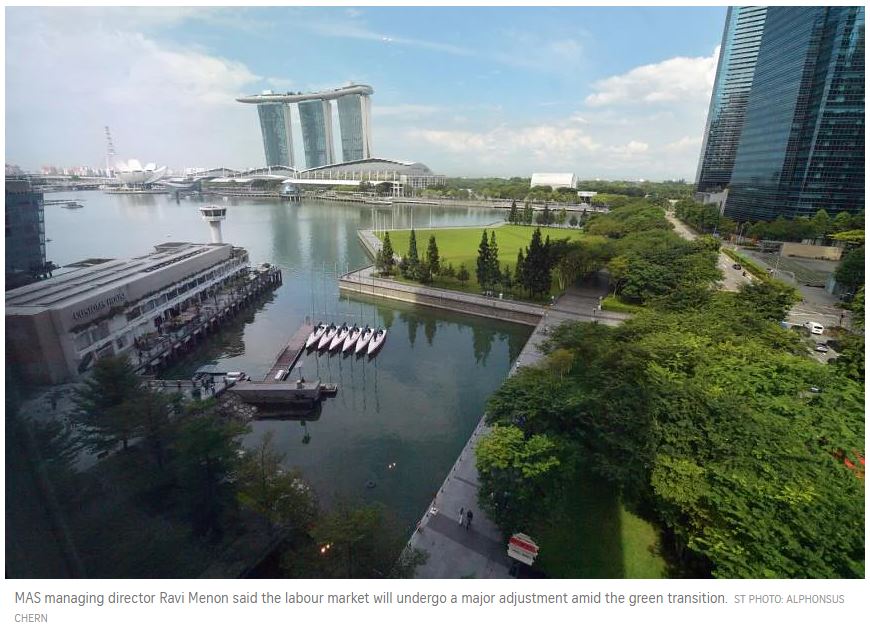Singapore: Transition to green economy must be orderly to keep inflation in check, job market stable: MAS chief
SINGAPORE – Decarbonising the global economy will induce inflation and trigger a major reset of the labour market, said Mr Ravi Menon, managing director of the Monetary Authority of Singapore (MAS).
However, an orderly transition to a greener economy may help keep both inflationary pressures and the disruption in labour markets manageable, he said in a speech at the Economic Society of Singapore’s annual dinner on Wednesday (Aug 17). Mr Menon delivered the speech remotely as he had tested positive for Covid-19.
The MAS chief said the Bank of England (BOE) estimates that British inflation will increase by nearly 0.6 percentage point by the early 2020s if there is an orderly transition to net zero, but by 2 percentage points by the early 2030s if the transition is disorderly.
The BOE estimates are based purely on climate change and associated transition risks and do not include the sources of the current surge in prices from factors such as supply chain disruptions and geopolitical tensions.
According to the BOE, a delay in implementing policies for net-zero transition may lead to disorderly measures, such a sudden hike in carbon prices or massive retrenchment of investments from the traditional fossil fuel industry leading to excessively high energy prices.
Mr Menon said that even in an orderly transition, inflation is likely to rise as emissions will have to be taxed to achieve net-zero goals.
“The right price on carbon sends a powerful signal across the entire economy,” he said.
“It induces consumers to reduce demand for carbon-intensive goods and services, firms to move to low-carbon technologies, innovators to invent and develop new low-carbon products and processes, and investors to fund and commercialise them.”
However, higher energy prices will feed through into the production of many goods, and prices overall will rise.
“I do think inflation is going to be higher than what we have seen in the past,” he said, referring to the past decade when inflation was so low that central banks in major economies lowered their interest rates to near zero.
In Singapore, consumer prices averaged just 1.5 per cent in the past decade. But headline inflation in Singapore hit a decade high of 6.7 per cent in June this year and in Britain, it came at a 40-year high of 10.1 per cent in July.
Mr Menon said the move to decarbonise production and consumption of energy by intensifying investments in solar, wind power and electric vehicles will result in a surge in demand for metals and minerals such as copper, aluminium, cobalt, lithium and nickel, as well as rare earths.
According to the International Energy Agency, a Paris-based autonomous intergovernmental organisation, a world on track for net zero in 2050 will need six times as much of these materials in 2040 as it does today.
“The result is ‘greenflation’, or rising prices for these metals and minerals that are essential to renewable energy and technologies,” Mr Menon said.
“We are probably seeing a preview of that scenario currently,” he said, referring to the surge in prices since last year.
The central bank head said the labour market will undergo a major adjustment amid the green transition.
“Jobs will be lost in traditional carbon-intensive sectors, but new jobs will be created in carbon-neutral industries,” said Mr Menon, adding that it is estimated that about 200 million jobs will be created and 185 million lost globally by 2050 from a net-zero transition.
Still, he noted, there will be a period of net job losses during the transition: Foundry workers will not instantaneously be transformed into building-insulation experts.
“Worker reskilling and redeployment will thus be crucial. Identifying skills adjacencies will be a key part of worker retraining programmes.”
In Singapore, a comprehensive strategy to green the economy is taking shape, with a focus on boosting energy and resource efficiency and creating good jobs.
“The world should be upfront about the cost of decarbonisation and have concrete plans to support those adversely affected,” he said.
“Like all economic transformations, the green transition will involve winners and losers, and unless this is recognised and dealt with, the sustainability agenda will lose social legitimacy.”
Responding to a question on how central banks would respond to the inflationary impulse from decarbonisation, Mr Menon said that traditional monetary policy tools will be applied to ward off the risk of a generalised price surge across the economy.
“But it would not be wise to completely insulate the economy from rising prices because the relative price change is supposed to motivate the right behaviour and shift resources towards new investments,” he said.
Source: https://www.straitstimes.com/business/economy/transition-to-green-economy-must-be-orderly-to-keep-inflation-in-check-job-market-stable-mas-chief


 English
English




